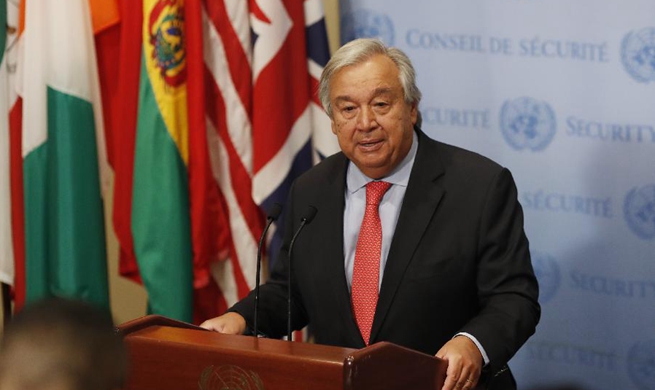by Marwa Yahya
CAIRO, Aug. 10 (Xinhua) -- Banking deposits have increased despite unprecedented hiking prices of services and commodities in Egypt.
"The Egyptians' deposits haven't negatively been impacted with the economic developments over the past two years," said Rashad Abdo, economics professor at Cairo University and head of the Egyptian Forum for Economic and Strategic Studies.
People wanted to secure an additional income to face the soaring prices amid high interests of the banks, Abdo told Xinhua.
The Central Bank of Egypt (CBE) announced on Monday that the total deposits in banking system, excluding the CBE, increased by 41 billion Egyptian pounds (about 2.3 billion U.S. dollars) to hit 3.525 trillion pounds by the end of April, up from 3.484 trillion pounds in March, 3.042 in 2017, and 2.761 in 2016.
The CBE allowed in November 2016 full float of the Egyptian local currency to limit shortage of foreign currency. The official exchange rate of the U.S. dollar then rose from 8.8 pounds to over 17.82 pounds at the moment.
After the pound devaluation, the inflation rates hiked to 34.2 percent in 2017, the highest rates in Egypt's modern history, compared to 12 percent before the pound float.
In an attempt to contain the inflation, state-run banks raised the interests to 20 percent, until the CBE reduced it to current 15 percent.
"Banking' savings are favorable by most of the Egyptians who are against the risk of entering private projects," Abdo added noting that the more deposits saved in the banks, the more loans released for the investors which by the end will limit the unemployment rates.
However, the economic expert said "the high turnout of savings will reduce the inflation rates theoretically," because the cash liquidity in the markets will be squeezed and the demand on products will be reduced.
According to Egypt's official statistics agency report on Thursday, the inflation rate reached 13 in July.
Hisham Ibrahim, professor of funding with Cairo University, said the increase of deposits was "expected."
The CBE, in light of economic reform program that was adopted in the end of 2016, raised the bank interests to withdraw the cash liquidity to limit consumption.
Along with float of the currency, the government applied the reform plan including gradual lift of subsidy on fuel, electricity and gas, and approval of economic laws on taxes and investment.
Ibrahim sees "saving is a substitute for consumption in Egypt to avoid high prices."
He added that although consumption stimulates the economy, in difficult economic times, reducing consumption is better to direct the money for deposits, and then the banks would in turn pump them in investment and production that will reduce prices later.
Economic professor Waleed Gab-Allah mentioned other reasons behind the increase of banking deposits such as eliminating speculation on dollars and real estate after the pound float.
Gab-Allah urged the businessmen and investors to use the deposits in establishing projects that create jobs, and increase growth rates and production levels to narrow the gap between the demand and supply in the markets.













